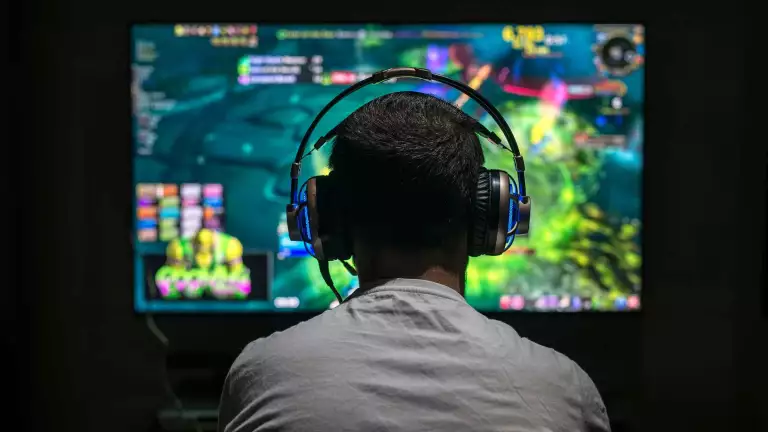When people say generative AI is everywhere, they’re likely not including alien worlds, ancient dungeons, or pirate galleons. Yet GenAI—which creates original text, images, and other forms of content—has the potential to bring new efficiencies to game development and new experiences to players. With it, studios can forge more immersive worlds and get them to market at greater speed and lower cost.
So far, however, the industry’s embrace of GenAI has been uneven. In a December 2023 BCG survey, 43% of smaller, indie publishers said they were running GenAI pilots, while just 23% of larger, AAA publishers had entered or moved beyond the pilot
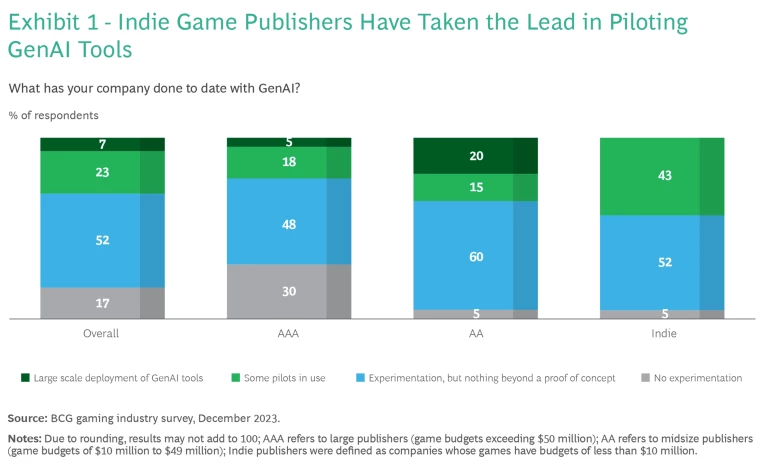
Behind the caution are some valid concerns, including GenAI’s impact on intellectual property rights, organizational readiness, the potential for offensive output, and the maturity of the tools. (See Exhibit 2.) Yet in the gaming industry, hanging back often means falling behind. By more actively running pilots and identifying how best to leverage GenAI in game production, monetization, marketing, and player support, smaller indie developers aren’t just showing what’s possible. They’re improving their competitive position.
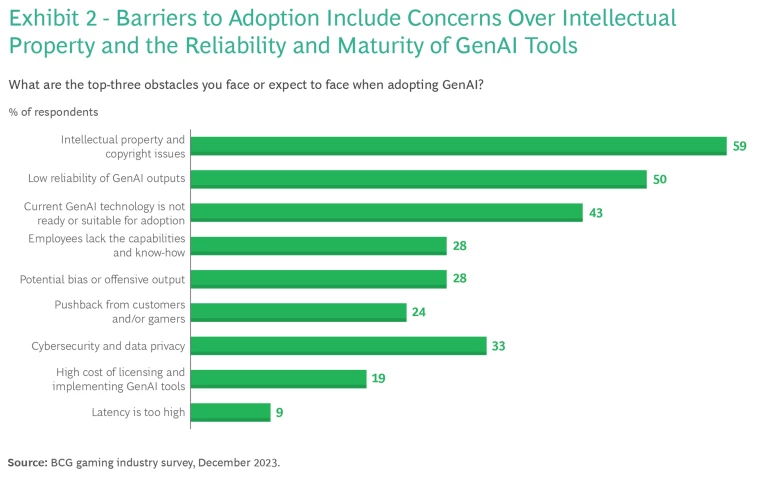
Our research—which included the survey as well as interviews with key players from across the gaming ecosystem—corroborates what we see in our own work: GenAI has transformative potential for the gaming industry, but we are still at the earliest stages of adoption. It’s time to step that up. The technology can accelerate every phase of game development. It can reduce manual work, freeing teams to focus on the details that take a game from good to great. And when used wisely, it can deliver its benefits in efficient, responsible ways.
GenAI can reduce manual work, freeing teams to focus on the details that take a game from good to great. And when used wisely, it can deliver its benefits in efficient, responsible ways.
Value Across the Gaming Life Cycle
GenAI’s trump card is its range. Across industries, the technology is turbocharging everything from workforce training and contract drafting to marketing and customer support. But in gaming, the breadth of applications is particularly eye-opening. We’ve identified more than 40 high-value use cases spanning the full gaming value chain, from concept to live ops (in which publishers deliver new features, push updates, and manage in-game events and tournaments, among other activities). (See Exhibit 3.)
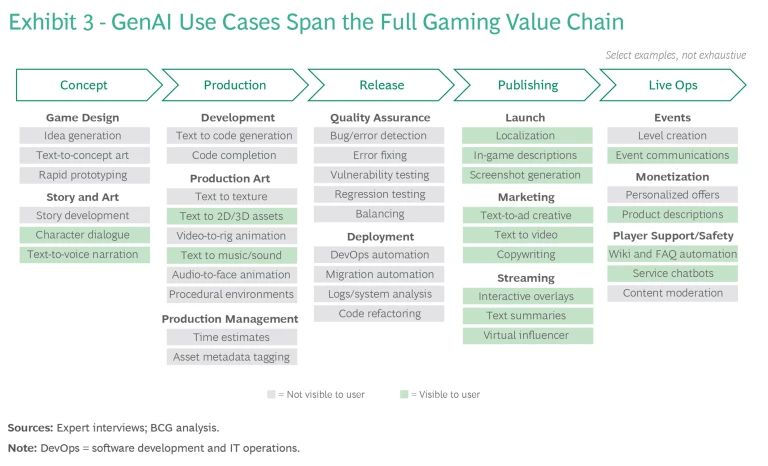
These use cases can be particularly powerful in concert. Consider, for example, the game development cycle. Already, some studios are piloting GenAI to create detailed, high-quality concept art. This helps developers quickly zero in on the worlds they want to create. At the programming stage, other pilots are using the technology to create code, speed up debugging, and accelerate level testing and game balancing. When fleshing out their worlds, some developers are experimenting with GenAI to create context-aware dialogue for NPCs (nonplayer characters) and text-to-voice narration. Other pilots are targeting publishing, with GenAI handling localization for different markets, creating app store descriptions and advertising copy, and even serving as virtual influencers, streaming game play—and whetting appetites—across popular platforms like Twitch and YouTube.
In the most extreme application of Gen AI, some developers are attempting to build a model that can generate an entire game from a text prompt, such as “build me a Minecraft-style game themed like Pokemon that I can play on my phone.” To be sure, such a model—particularly one that generates games with the quality we’ve come to expect—is a long-term goal. For the near term, we’re likely to see innovation that’s more incremental than disruptive, with GenAI enhancing discrete steps of the game development process.
By identifying the impact that matters most, companies can focus their efforts—and their road map—with greater precision.
The list of use cases will likely grow, too, given the burgeoning interest of investors. Total GenAI venture capital funding amounted to some $12 billion from 2019 through 2022, with $169 million dedicated to gaming-specific applications, such as generating in-game objects, or the textures or skins on those objects. Think of the cliffs at the edge of a game world landscape. Few players may notice the textures of a distant mountain as they do battle, but someone must still create that imagery. With GenAI handling such tasks, creators are free to focus on more prominent aspects of the game without sacrificing the level of detail in the backgrounds.
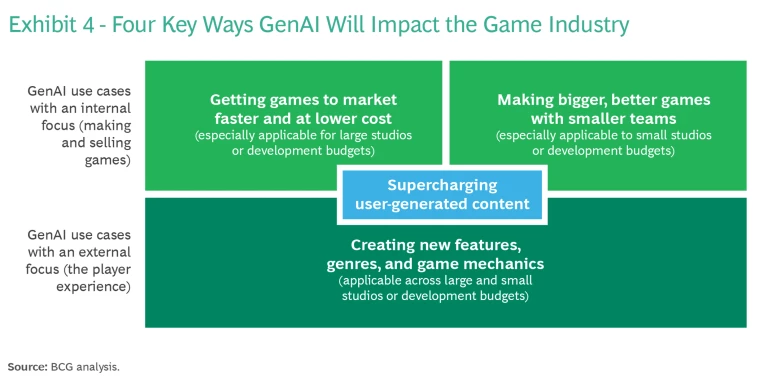
The way forward with GenAI will vary, depending on an organization’s market, circumstances, and resources. By identifying the impact that matters most, companies can focus their efforts—and their road map—with greater precision. As a starting point, we’ve found it helpful to consider the four broad ways in which GenAI can impact the game industry (see Exhibit 4):
- Getting Games to Market Faster and More Cost-Effectively. Game development means orchestrating many labor-intensive processes. Art production, music and dialogue creation, localization, 3D modeling, programming, quality assurance testing—the list goes on. None of this comes cheap and the trajectory is decidedly northward. Back in 2010, God of War III, one of that year’s biggest productions, cost some $44 million to make. Today’s AAA games commonly see development budgets in excess of $200 million, according to a 2023 report by the UK’s Competition and Markets Authority. Through automation, GenAI can reduce the cost of many game development tasks. Most game publishers get this: 68% of studios expect to realize savings. But it’s the biggest game developers that may see the biggest upside, since the work GenAI can take on can comprise up to half a AAA title’s budget.
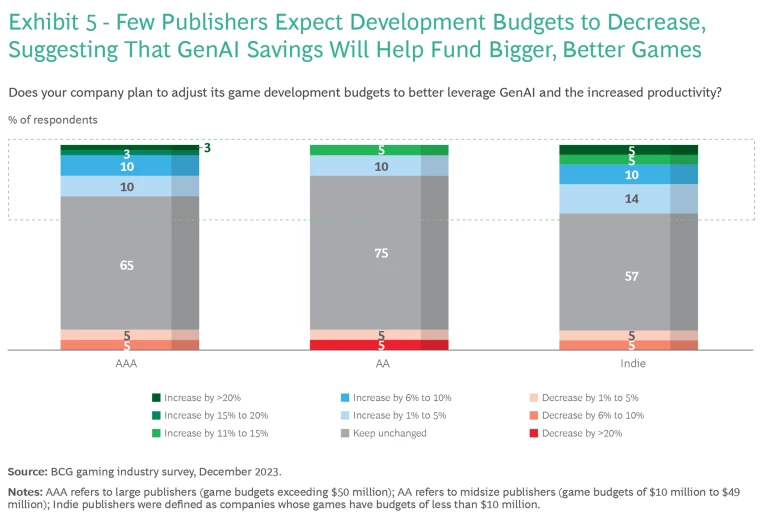
This doesn’t necessarily mean budgets will shrink. Indeed, we found that overall, only 10% of respondents anticipate game development budgets to decrease, whereas 26% of AAA publishers and 34% of indies anticipate higher budgets. (See Exhibit 5.) This suggests that instead of pocketing the savings, studios will steer those funds toward the development of bigger and better games.
Just as critically, GenAI automation—and the speed it fosters—reduces the risk that a game won’t launch on time. The word is getting out on that, as well: 60% of responding studios expect to launch their games faster. Already, some developers are seeing tangible results from making games with greater efficiency. Goodgame Studios was able to accelerate level development for its match-3 puzzle game, Home & Garden: Design Makeover, launching the game on time with 16 times the number of levels it would have produced manually.
- Creating New Features, Genres, and Game Mechanics. More than half––58%––of survey respondents say they expect AI-enabled game-play features, like interactive NPCs, to be a key benefit of GenAI. Right now, it’s the indie and AA publishers who are most bullish on GenAI’s impact on game quality. (See Exhibit 6.) Yet ultimately, it may be the AAA studios who have the most to gain. For larger developers, the pressure to innovate can be especially urgent. These companies invest enormous sums in their key franchises and with each new version, players expect something more than enhanced graphics. By creating content that heightens the player experience or enables new types of game play, GenAI helps studios take their next game to the next level. Case in point: Convai, a California-based AI company, is developing GenAI technology that creates on-the-fly NPC dialogue. This not only eliminates the need for scripted responses, it brings an element of spontaneity—and perhaps unpredictability—to in-game conversations.
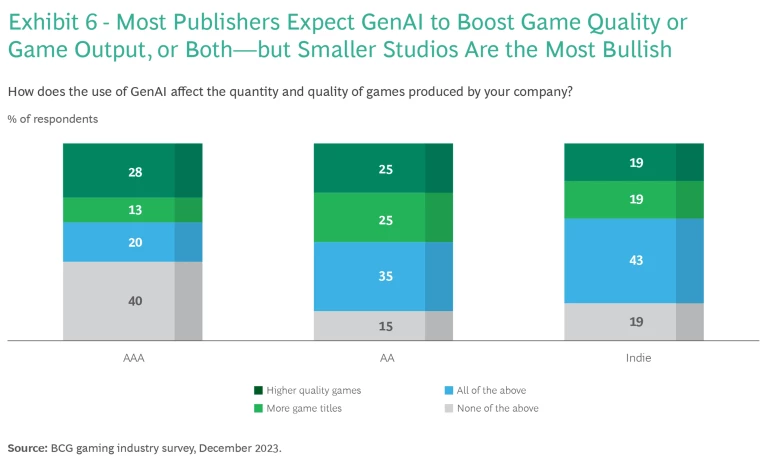
- Making Bigger, Better Games with Smaller Teams. New tools for art generation, music production, play testing, and level creation—among other things—enable developers to make bigger, more complex games with fewer resources. For smaller studios in particular, GenAI becomes a de facto workforce. It also lowers the technical barriers, enabling more people—including freelancers and new company founders—to run with their ideas. By making game development more accessible, GenAI can spark the surprise hits that seemingly come out of nowhere—and change the industry.
- Supercharging User-Generated Content (UGC). Some of the most lucrative gaming intellectual property (think Fortnite, Minecraft, and Roblox) owe their success—and longevity—to user-created content: modifications that add, tweak, or expand on in-game features. By embedding GenAI in UGC tools, studios make it easier to create sophisticated, compelling content, the kind that expands both a game and its audience. Roblox, for instance, is developing GenAI-powered tools that, in effect, turn any player into a potential content creator. At the same time, by automating the more mundane, repetitive aspects of UGC creation, the tools give a boost to experienced designers, letting them spend less time iterating and more time innovating.
Accelerating the GenAI Journey
GenAI can speed game development, enhance player experiences, and fuel competitive advantage. But the concerns around the technology are not trivial—or unfounded. GenAI models train on enormous volumes of unstructured data, such as images, video, and audio. In our survey, 59% of respondents said they worried about issues relating to copyright and other intellectual property rights (such as inadvertently infringing on someone’s rights or discovering that someone has infringed on their own). Fully half of the responding studios were apprehensive about GenAI algorithms reliably producing compelling and on-point content; for example, 3D art depicting the atmosphere the game’s designers envisioned. And 28% worried about the potential for bias or offensive content.
So how can studios smooth out their GenAI journey, launching and scaling pilots while reducing risks?
One of the best ways to see how GenAI fits into workflows is to roll up your sleeves and experiment. But it’s important to try GenAI without disrupting existing projects and processes.
By embracing four key principles, gaming companies can gain familiarity with GenAI, zero in on high-value use cases, and build a foundation for implementing and scaling the technology—in an efficient, responsible way:
- Lay the groundwork. Savvy companies set the stage for GenAI by getting their data ready for GenAI models. The work can be particularly complex because unstructured data—the fuel for GenAI—isn’t stored in traditional databases, where it would be clearly labeled and indexed. Companies therefore don’t tend to have a deep understanding of that data: where it is, where it comes from, how they can and can’t use it. But GenAI’s data management problem is not insurmountable. The solution, it turns out, is GenAI itself . The technology can augment and even automate tasks like data labeling and cleansing. We also recommend establishing a responsible AI policy, which helps reduce risk, but also improves the performance of AI systems. Getting the word out on the benefits of GenAI is crucial, too. By talking to employees—particularly artists and other content creators—and seeking their input on how GenAI might complement and enhance their work, studios can get a better sense of where the technology can deliver the greatest returns.
- Experiment, test, and learn. One of the best ways to see how GenAI fits into workflows is to roll up your sleeves and experiment. But it’s important to try GenAI without disrupting existing projects and processes. We recommend creating a “skunkworks” team and giving it an explicit goal to pilot game development using GenAI tools. This team should have the runway to experiment on multiple titles. By testing, learning, and applying insights across the studio’s full portfolio, the pace of learning quickens. The team should track the time it spends on each release and the quality of its work. We also recommend documenting the lessons learned along the way. These will be particularly important when moving beyond the test-and-learn stage and deploying GenAI at scale.
- Scale what works best—and matters most. Experimentation and proofs-of-concept (POC) help studios focus their GenAI efforts. But it’s much easier to develop a POC than to scale GenAI tools across an organization (much less a community of thousands, or even millions, of users). Studios should stand up a process to identify high-value POCs so they prioritize the right use cases. They should then devote sufficient funding to these use cases and foster wide-scale adoption through change management.
- Get ahead of risk. Strong data governance and a responsible AI program go a long way when it comes to addressing concerns around GenAI. But there are additional steps studios can take to reduce risk and, at the same time, build their GenAI maturity. Across industries, GenAI first movers tend to embrace certain behaviors . They pursue strategic partnerships with GenAI technology companies, prioritize up-skilling and hiring to build GenAI talent, evaluate the costs and benefits of deployment , and anticipate the impact of GenAI on their workforce. That last factor warrants particular attention: if there’s one predominant trait of GenAI leaders, it’s their tenacious focus on people, which aligns with our 10, 20, 70 rule . To realize the full power of AI, you need to empower the people who will use it, enhance it, and envision new ways to put it to work.
Generative AI has the potential to transform the gaming industry. By sparking innovation, accelerating processes, and augmenting human capabilities, it can help studios do what they do best: create unique and immersive experiences. GenAI is not a plug-and-play technology, and its success requires tackling the pitfalls along with the possibilities. But companies that get it right will find that GenAI is—literally—a game changer.
